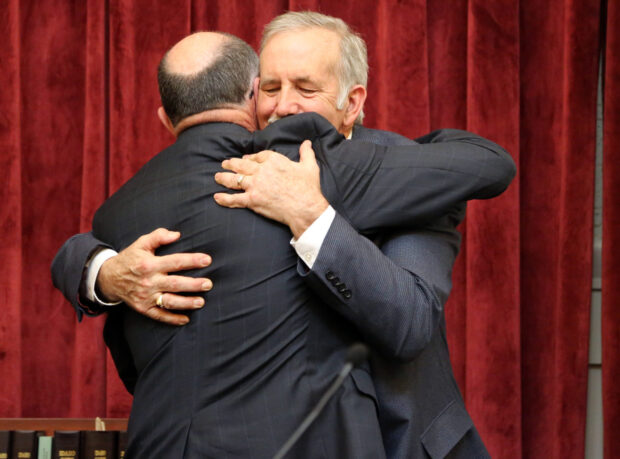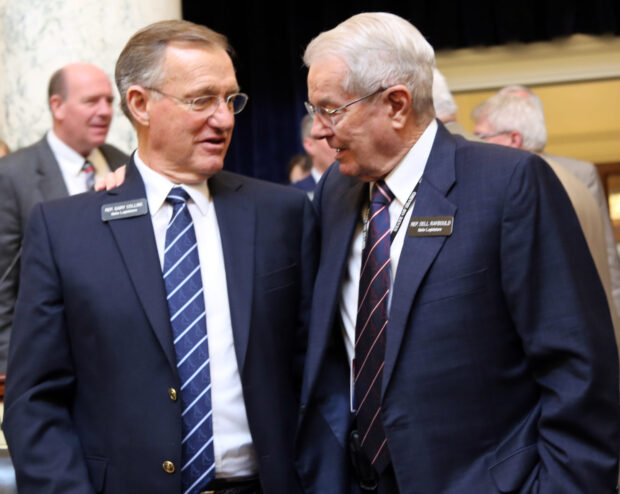In the final moments of the 80th and final day of the 2017 legislative session, one last-minute bill survived. And one died.
Senators approved a bill that could provide state funding for sidewalks and bike lanes near schools. Senators rejected another attempt to cut income taxes.
The tumultuous 2017 legislative session officially adjourned late Wednesday morning, with the House dropping the final gavel at 10:48 a.m., and the Senate following suit precisely at noon.
Most education issues were resolved by the end of last week — and legislative leaders’ targeted adjournment date of March 24. For example, the $1.7 billion K-12 budgets sailed through both houses last week and sit on Gov. Butch Otter’s desk. Tax and transportation issues kept lawmakers in town for part of this week — as the houses agreed to eliminate the sales tax on groceries and agreed on a plan to spend more than $300 million on highway projects.
That left the Senate with a little bit of final business. Wednesday’s highlights:
Safe routes to school
Less than 24 hours after it was unveiled in a House committee, a safe routes to school bill made its way through the Senate.
House Bill 334 would allow the Idaho Transportation Department board to siphon some state dollars into bike lane and sidewalk projects. It’s a companion to Senate Bill 1206, the larger transportation bill that passed both houses Tuesday — since SB 1206 provides the pathway to fund the sidewalk and bike lane projects.
After the Senate Transportation Committee endorsed HB 334 in a brief morning meeting, the full Senate passed the bill in a floor vote.
The Senate vote was 26-8. Interestingly, four of the dissenting votes came from Republicans on the Senate Education Committee: Chairman Dean Mortimer of Idaho Falls, Vice Chairman Steven Thayn of Emmett, Lori Den Hartog of Meridian and Bob Nonini of Coeur d’Alene.
Earlier this session, the Senate had passed a nonbinding safe routes to school bill, with no funding attached.
Income tax cuts
Without debate — but with a few pointed remarks — the Senate overwhelmingly rejected the House’s second and final stab at cutting income tax rates.
Spearheaded by House Majority Leader Mike Moyle, the House attached $27.9 million in income tax cuts to a bill to cut unemployment taxes by $115 million over three years.
The Senate approved the unemployment tax cuts. On Wednesday, senators had to decide whether to approve the unemployment tax bill, with the income tax amendments added into the mix.
Sen. Todd Lakey, R-Nampa, urged his colleagues to “take an objective look” at the amended bill. And as a sponsor of the original bill, he said he did not take the amendments personally.
Other senators were less conciliatory.
Sen. Chuck Winder, R-Boise, said he was voting against the amended tax bill, citing the conflict between the houses. Sen. Steve Vick, R-Dalton Gardens, called the legislative gamesmanship “unfortunate,” and as a result, employers will pay higher taxes than they need to.
In the end, the Senate rejected the amended bill on a 5-29 vote. Supporters were Senate President Pro Tem Brent Hill, R-Rexburg; Majority Leader Bart Davis, R-Idaho Falls; Kelly Anthon, R-Burley; Fred Martin, R-Boise; and Lakey.
The Senate vote leaves tax cuts in limbo, as the session ends.
The unemployment tax cut is dead, along with the income tax cut. The grocery tax cut passed both houses — after the Senate amended Moyle’s first income tax cut proposal to turn it into a grocery tax bill — but Otter has voiced his opposition. Otter has stopped short of overtly threatening to veto the bill, which has a budget impact of nearly $80 million.
‘We did well’
Although education issues were not part of the legislative endgame, public schools continued to be an important issue — especially in the budget process. This month, lawmakers passed a suite of school budget bills that will increase state general fund K-12 spending by 6.3 percent, or about $100.6 million over current levels. The largest chunk of new spending was a $61.9 million initiative to give teachers a third consecutive year of raises under the career ladder salary law.
In the moments after the session adjourned, House Speaker Scott Bedke praised legislators’ commitment to invest in education.
“We did well with regard to public schools,” said Bedke, R-Oakley. “We stayed the course on the five-year plan. Arguably this was the toughest year, financially, because it required the most new extra money to go into the career ladder.”
Bedke also applauded lawmakers for setting aside $1 million in new funding for additional training for school administrators in the wake of a controversy over the accuracy of teacher evaluations. Teacher evaluations are now linked by law to the career ladder, and serve as the basis for how teachers earn higher pay.
“I am glad they have taken steps to correct and make sure the evaluation process that is part and parcel to the career ladder is ready to go for next year when we start needing to rely on it for movement,” Bedke said.
Even though the legislative session has ended, all eyes will be on Otter in the coming days as he takes final action on late-session bills, including the grocery tax bill and the seven K-12 public school budgets. Legislative rules give Otter 10 days after a legislative session adjourns to sign bills into law, veto them or allow them to become law without his signature.
A busy offseason
Even though the session just ended, 10 legislators will continue to work through the offseason.
The school funding formula interim committee will return to work, probably in May.
Unchanged since 1994, Idaho’s funding formula is a complicated attendance-based model that drives the flow of nearly $1.7 billion in state general fund money to schools each year. Critics say the formula is outdated and is not designed to handle 21st century educational realities — such as increased student mobility, online learning, dual credit courses and the proliferation of charter schools.
Co-chairwoman Wendy Horman plans to expand the committee’s reach by inviting leaders of education groups to serve on subcommittees alongside the lawmakers.
The group will also work with a consultant and use computer models to simulate changes to the formula and invite education leaders from other states to share best practices.
The funding formula is one of several key K-12 issues left unresolved by the 2017 Legislature. But as the committee heads into its second year on the job, Horman said she won’t rush into a rewrite.
“When we’re ready to move to the creation of a new formula, we will,” said Horman, R-Idaho Falls. “I don’t know if we will actually have a new formula by next session.
“We should have strong modeling tools for sure, and if we can get widespread agreement around the best approach it is possible we will have something. But it is also possible we will still be exploring what the best Idaho solution is.”
Idaho Education News reporter Clark Corbin contributed to this report.
Coming Thurday: Meet some of the Legislature’s freshman class of 2017.


